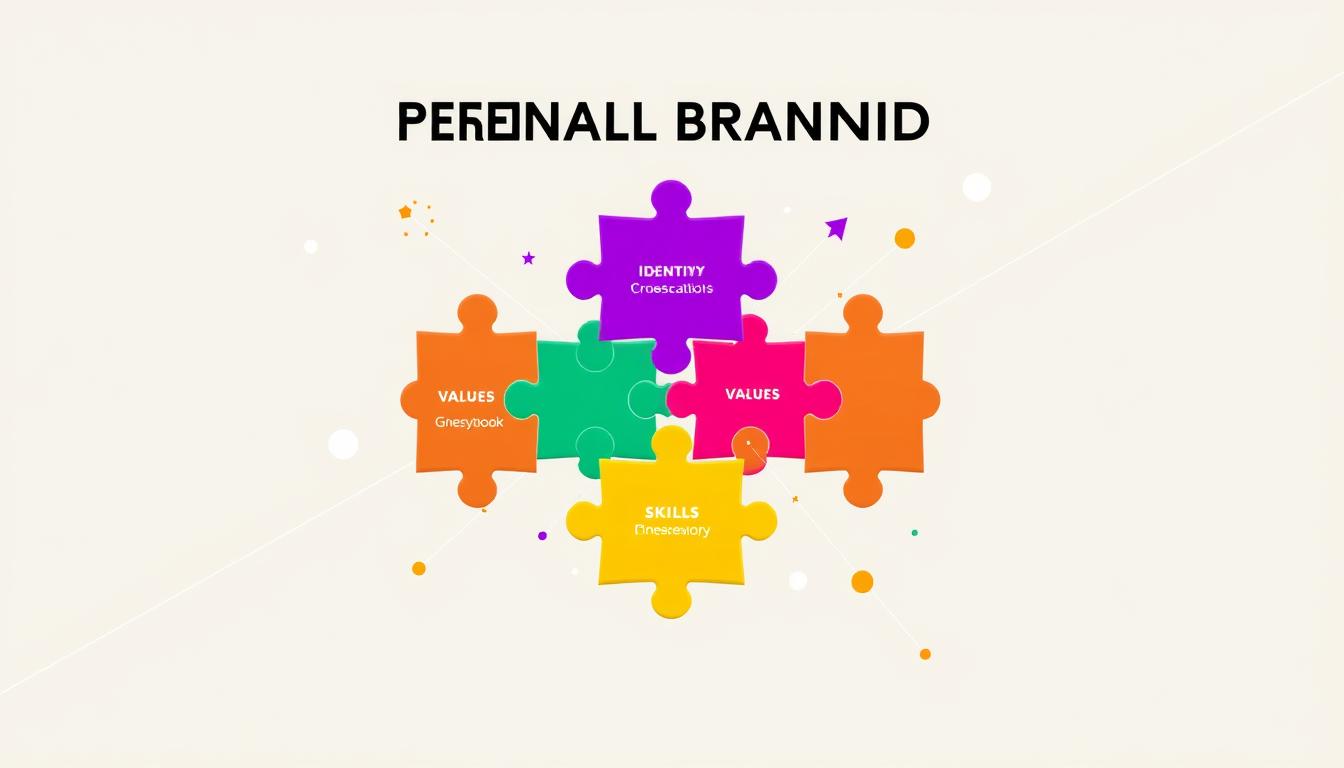Ever wondered why some people shine in their careers while others don’t? It’s often because they have a clear personal branding framework. In today’s job market, knowing how to build your personal brand is key. This article shows why personal brand development is crucial.
It helps you create a unique identity that connects with your audience. This leads to career growth and personal satisfaction. With a solid branding strategy, you can change how you’re seen in the professional world.
Key Takeaways
- The three core elements of a successful personal branding framework are Content, Community, and Impact.
- Focusing on customer storytelling can create strong connections and enhance your brand narrative.
- Establishing a community while creating impactful content leads to positive word-of-mouth marketing.
- Performance, image, and exposure play distinct roles in determining overall career success.
- Engagement through public speaking and collaborations can significantly increase your visibility in the market.
Understanding the Importance of Personal Branding
Personal branding is key in today’s job market. It helps shape how people see you in your field. With social media’s big role in careers, it’s crucial to market yourself well. Sites like LinkedIn are great for building a strong online presence.
A good personal brand can make you stand out, especially in sales and marketing. It lets you show off your skills and experiences. Being real is important; people trust content from real experiences more than ads.
For entrepreneurs, a strong personal brand can help your startup shine. It draws in potential customers. A clear brand message is essential for standing out online. Using the right keywords can also boost your visibility.
Hinge’s Visible Expert Revolution shows that being seen can lead to higher earnings. Being an expert through public speaking or writing books can also get you noticed. Personal branding is becoming more important for career growth.
What is a Personal Branding Framework?
A personal branding framework is a strategic structure for those who want to define and manage their personal brand. It helps in understanding how others see you and how you see yourself. This is key, as experts in branding have shown.
The framework includes important parts like:
- Clarity: Knowing what makes you unique.
- Consistency: Making sure your message is the same everywhere.
- Content Creation: Creating content that speaks to your audience.
- Effective Communication: Sharing your ideas and values clearly.
By following a structured approach to branding, you can set clear goals for your personal brand. This includes:
- Setting clear objectives for what you want to achieve.
- Building your brand on your passions, ensuring authenticity.
- Defining your target audience to align with your brand goals.
- Creating a messaging strategy tailored to audience personas.
- Selecting appropriate marketing channels to reach your audience effectively.
Using tools like Notion for audience personas can help manage this information well. Knowing your audience’s demographics, interests, and concerns helps in creating messages that resonate.
Research shows how important personal branding is in the workplace. A Deloitte study found that those who focus on branding are happier and get more leadership roles. Also, 70% of employers check social media before hiring, showing the need for a strong online presence.
In today’s digital world, having a personal branding framework is crucial. It’s not just a choice but a must for anyone wanting to make a mark in their career.
The Benefits of Developing a Personal Brand
Creating a personal brand has many advantages for your career. It’s not just about being seen; it builds trust and credibility. An authentic personal brand shows your values and mission, helping you connect with others.
One big career advantage is being more visible. People with a strong personal brand often get picked for important roles. For example, 42% of new hires come from referrals. This shows how important a good personal brand is for getting ahead.
A well-made personal brand shows you’re competent and reliable. When you act on your words, people trust you more. This trust is key for growing your career and building your brand’s credibility.
In today’s competitive world, a personal brand sets you apart. It opens doors to new connections and chances. A strong brand can even lead to job offers without interviews.
To get these benefits, start by knowing yourself and your goals. Find out what makes you unique. Then, use content and networking to shape how others see you. This will help you succeed in personal branding.
Key Elements of a Personal Branding Framework
Building a strong personal brand starts with knowing the key elements. These include clarity, consistency, content, and communication. Each one is vital in showing who you are to the world.
Having a clear brand message helps people understand you quickly. Being consistent makes your identity easy to spot. Good content connects with your audience, and the right communication channels lead to meaningful talks.
To show how these elements work, let’s look at a framework:
| Branding Framework Element | Importance | Example Application |
|---|---|---|
| Clarity | Helps define your unique value proposition clearly. | Using concise messaging on your website and social profiles. |
| Consistency | Builds trust and reinforces recognition. | Utilizing the same logo and color scheme across all platforms. |
| Content | Engages and informs your target audience. | Sharing relevant blog posts and updates on professional projects. |
| Communication | Encourages feedback and relationship-building. | Actively responding to comments and messages on social media. |
These elements together boost your brand’s identity. They make sure your personal brand is not just remembered but also connects with your audience.
Defining Your Purpose in Personal Brand Development
A successful personal brand starts with knowing your purpose. This purpose is the base of all your branding efforts. It guides your choices and shapes your story. By looking into your mission and passion, you can find your way in your career.
Exploring Your Mission and Passion
Your personal mission shows what your brand is all about. It highlights your values and goals. Thinking about your mission helps you understand what drives you. This makes your brand connect better with your audience.
Think of your mission in terms of:
- Knowledge
- Skills
- Expertise
- Experiences
- Passion
- Value proposition
Identifying Your Strengths
Finding your strengths is key in building your personal brand. Pick your top five strengths or super skills. Use a three-step process to find them:
| Step | Description |
|---|---|
| Document | Write down your skills and experiences that contribute to your brand. |
| Distil | Analyze your list to identify which skills truly define your expertise. |
| Validate | Seek external feedback to confirm the strengths that resonate with others. |
As you define your mission and find your strengths, keep them in mind. Being aware of these helps keep your brand consistent and real. Share your insights and join discussions to build a community focused on personal branding.
Conducting a Brand Audit
Doing a brand audit is key for personal brand growth. It helps you understand your brand’s value and where you stand in the market. You’ll look at your strengths, what others say about you, and your achievements.
It’s smart to check your brand regularly, like every six months. This keeps you in line with what people want and expect.
Seeing how others see your brand can show you what to work on. First, set clear goals for what you want to find out. Then, start by gathering basic info about your brand.
It’s also good to talk to people who know your brand well. Their opinions can really help you see things from a different angle.

Listening to what customers say is important. It helps you make sure your brand meets their needs. This builds trust and keeps them coming back.
Look at all parts of your brand, like how you market yourself and how you act on social media. Also, think about how people feel when they deal with your brand.
| Brand Audit Component | Description |
|---|---|
| Internal Branding | Evaluates brand values, culture, and internal communication. |
| External Branding | Assesses how the brand presents itself through marketing materials and social media. |
| Customer Experience | Focuses on customer interactions with the brand across various channels. |
After you’ve looked at all the data, you can see what’s working and what’s not. Then, make a plan to fix any weak spots. This plan should match your personal goals and dreams.
Keep an eye on how your brand is doing after you make changes. This helps make sure your brand strategy is working well.
Doing a good brand audit has many benefits. It can make your brand more effective and profitable. You might sell more and keep more customers. A strong brand also means you don’t have to work as hard to get new customers. To learn more about the brand audit process, check out this resource.
Constructing Your Personal Narrative
A well-developed personal narrative is key to effective personal branding. It’s more than just your biography; it’s about the experiences that shape who you are. Finding your unique story is crucial in today’s competitive world. By using your personal narrative and focusing on your value proposition, you can build a compelling brand that connects with your audience.
Identifying Your Unique Story
Your unique story is the base of your personal narrative. It should show your core values, like humility and compassion. Knowing your journey helps you share your skills in a way that people can relate to. To craft your story, look back on your experiences. They should show your achievements and help solve your audience’s problems.
Remember, personal stories often touch people more than polished messages.
Crafting a Memorable Value Proposition
Crafting a value proposition is vital for personal branding. It should clearly state the value you offer and solve your audience’s problems. Keeping your messaging consistent helps build your brand identity. Use data and analytics to improve your value proposition, keeping it true to your story.
A strong value proposition, backed by real storytelling, makes you more visible. It positions you as a leader in your field.
Embodying Your Brand Consistently
To embody your brand, focus on being consistent in all interactions. Your personal brand grows when you stick to your core values and message. This is true whether you’re on social media or at work. Being clear and consistent helps people trust and recognize your brand.
To keep your brand consistent, try these strategies:
- Align daily actions with your brand values for real interactions.
- Standardize visual elements like fonts, colors, and logos to boost recognition.
- Create a social media presence that tells your story and connects with your audience.
- Practice active listening and communication to make sure your message hits home.
- Participate in industry events to show off your skills and meet others who share your interests.
Being consistent across platforms can really boost your credibility. A strong brand shows who you are, what you believe in, and what you stand for. It helps you connect deeply with people who share your vision. Listening to feedback and staying true to your brand helps you stand out in a busy world.
| Consistency in Branding Strategies | Impact on Brand Embodiment |
|---|---|
| Defined Core Values | Increased Trust |
| Visual Branding Elements | Enhanced Recognition |
| Interactive Social Media | Stronger Engagement |
| Continuous Learning | Improved Adaptability |
| Active Community Participation | Greater Influence |
Consistent branding creates a rich experience for your audience. It shows you’re genuine and passionate. The right mix of being yourself and strategic branding builds lasting connections and boosts your visibility.
How to Communicate Your Brand Effectively
Effective brand communication is key to sharing your personal brand’s message. There are many ways to show off your brand. Here are the top ten ways to communicate personal branding:
- Maintain an updated LinkedIn profile and CV.
- Use social media to share insights and connect with people.
- Practice public speaking to increase visibility and authority.
- Network often to build relationships and find opportunities.
- Make sure your appearance matches your brand.
- Choose words that connect with your audience.
- Use hobbies and activities to show your values.
- Have a headshot that represents your brand.
- Think about your voice and tone for talking.
- Have a clear personal brand statement.
A challenge for you: pick 1-2 ways from the list to boost your personal brand. Jeff Bezos said, “Your brand is what people say about you when you’re not in the room.” This shows how important your brand’s image is.
Using a self-introduction framework can help your personal brand. Also, pay attention to your dress code, colors, and accessories. They greatly affect how people see your brand. Even what you drink in meetings can change how others view you.
Voice and vocabulary are crucial in how others see your brand. Being consistent, like being on time, makes you seem trustworthy. What you’re involved in and your credentials add to your credibility. Hobbies can show your values and help you connect with others.
Online signals like your meeting background and email signature also show your brand. Having a clear messaging strategy ensures your brand looks the same everywhere. Focus on sharing your strengths and expertise positively. Avoid negative tactics that can harm your credibility. By being true to yourself and using the right voice and tone, you can share your unique value.
Building Your Online Presence Management Strategy
Having a strong online presence is key for building a personal brand. It needs careful planning and action to make a good impression on the web. By managing your online presence well, you can show off your skills and achievements. This helps build trust with your audience and potential employers.
To create a solid online strategy, follow these steps:
- Defining brand identity to stand out online.
- Creating quality content to engage and build authority.
- Optimizing online profiles on sites like LinkedIn, Instagram, and Twitter.
- Engaging with the audience through comments and messages.
- Monitoring performance to improve your strategy.
Brands need to use different online platforms to stand out. LinkedIn is great for professional branding. Instagram and Facebook are good for creative professionals. Using these platforms well can help you advance your career and find new opportunities.

Being consistent is key in branding. It means sending the same message everywhere. This builds trust and credibility, which are vital for a strong online presence. Managing your presence is an ongoing task that includes keeping your profiles up to date and engaging with your audience.
Also, taking courses on personal branding can help. For example, Cinute Digital offers courses on personal branding. They cover the basics and advanced social media tactics.
The digital world offers many chances to improve your personal brand. With good online presence management, you can increase your visibility, attract new opportunities, and create a unique identity. For more tips on building a strong personal brand, check out this resource.
| Platform | Key Benefits |
|---|---|
| Professional networking, showcasing skills, building industry connections | |
| Visual storytelling, connecting with creative audiences, portfolio display | |
| Real-time engagement, participating in conversations, sharing knowledge | |
| Podcasting | Positioning in niche industries, attracting guests, engaging target audiences |
The Role of Personal Branding Coaches
Personal branding coaches offer great support to those wanting to make a strong personal impression. The coaching industry has grown a lot in the last five years. In 2019, the U.S. business coaching sector made over $10 billion, showing a big need for these services.
A coach can help clients figure out their brand identity. They learn who their audience is and how to share what makes them special. Building trust is key, through being real, reliable, and true to your values.
A strong personal brand opens doors to many opportunities. It can get you featured in podcasts and magazines, boosting your visibility. In a crowded market, being authentic and impactful is crucial. Even new entrepreneurs are learning the difference between a logo and a real brand.
| Aspect | Importance |
|---|---|
| Expertise Establishment | Allows coaches to showcase knowledge and stand out. |
| Client Trust | Built through authenticity and reliability. |
| Word-of-Mouth Marketing | Promotes organic growth and referral opportunities. |
| Strategic Partnerships | Enhances brand reach through collaborations. |
| Income Growth | A strong brand can lead to exponential income increase. |
In short, a personal branding coach does more than just guide. They create a space for growth and learning. With a structured plan and ongoing support, coaches can greatly influence their clients’ branding journey. This mentorship is vital for success in today’s competitive world.
Monitoring and Iterating Your Personal Branding Framework
Personal branding is a journey that never ends. It requires constant brand monitoring and adjustments. People need to listen to feedback and check how their brand is doing. This helps find what’s working and what’s not.
To keep track of your brand well, try these methods:
- Do surveys to see what people think of your brand.
- Look at social media stats to see who’s talking about you.
- Talk to people who know your brand to get real feedback.
Using these methods gives you clear ideas for improving your brand. You might need to change your message, update your look, or focus on different people. By always updating your brand, you keep it strong and interesting to your audience.
Having a plan for always getting better is key in a competitive world. Here are the main parts of successful brand monitoring and improvement:
| Component | Description | Impact |
|---|---|---|
| Regular Feedback | Get opinions from your audience and friends. | Makes your brand more believable and relevant. |
| Performance Metrics | Use tools to track how people interact with your brand. | Helps you make smart changes to your brand strategy. |
| Adaptive Strategy | Be ready to change your brand based on new info and trends. | Keeps your brand strong and growing over time. |
With these steps, you can handle the challenges of personal branding. This way, your efforts will pay off in both personal and professional settings.

Conclusion
Creating a personal branding framework is a smart move for your career and personal growth. It helps you stand out in your field. By following key steps and principles, you can build a unique identity.
Being true to yourself, consistent, and clear in communication are key. These traits are crucial for a strong personal brand. They make you memorable and respected in your industry.
Studies show that a solid personal brand opens doors to new chances. This includes more job interviews, promotions, and media appearances. In fact, 76% of solo entrepreneurs see their visibility soar.
A well-thought-out brand architecture makes decisions easier. It also helps your audience understand you better. This leads to a stronger brand value.
Building a personal brand takes time and effort. But the benefits are worth it. 84% of solo entrepreneurs believe creating content is essential for a strong brand.
Having a personal brand is a valuable investment. It leads to long-term success and growth in your career.






